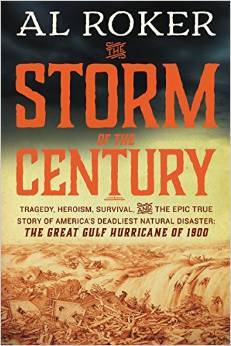
Rating: 2.5/3 Stars
Review:
First, the title. While I love Erik Larson, even his titles are sometimes too long for my taste, and they are not even that long. But THIS ridiculousness is just that. I mean, it is absurd and bordering on comical. THE SUBTITLE HAS A SUBTITLE. It was almost enough to make me not even bother with the book, because books with stupidly long titles tend to be on the pretentious side and no one likes too much pretension. Luckily, the book itself is written very simply, almost too simply for what the title implied. Does that even make sense? Oh well, it makes sense to me at least.
This is by no means the worst book I have ever read. Though it is certainly written in such a way that 'popular' history is, to make is easily accessible, there are some good things here. I did like that the book introduced and focused on specific citizens of Galveston prior to the hurricane. Though as I have said in other reviews, when there are children involved, that always seems to tug at my heart more and the moment we meet little Louise, I had to flip to the end to make sure she survived. I'm not sure I could have continued reading if she hadn't. It is one thing to think about the destruction and death in general terms, because in that way the victims are nameless. But when you get more personal, it is even harder to comprehend or accept tragedy on this scale. I don't mean to make that sound impersonal, but it does make the reading of events easier to stomach.
The book moves very quickly and I read it in almost one sitting. It menaders back and forth between Galveston, meteorology, and the path of the hurricane. I found this to be interesting, though was less interested in the meteorology in general. Once again American arrogance shines through brightly, and the warnings from Cuba are silenced and ignored. It is infuriating that so many lives could have been saved had they just listened. It is heartbreaking to think of all these people going through such trauma and tragedy, for nothing.
I am especially interested in reading more about Issac Cline. It is a wonder he was able to continue in his job after losing his wife and unborn child in the storm, and some of the blame can surely be laid directly on his shoulders for denying the necessity of building a seawall to protect the island city. He was arguably the best weatherman in the country and his opinion was naturally highly valued. Had the seawall alone been built, even if the warnings from Cuba still been ignored, who knows what difference that might have made. I understand that in that time they were of course operating with the best scientific understanding of the time, and hindsight is always 20/20, but I imagine that burden might have been difficult to carry for the rest of his life.
I am wavering back and forth between 2.5 and 3 stars on this one. It really was okay, and it is not that I didn't like it at all, I just have a feeling that after I finally get around to reading Larson's version (Isaac's Storm), everything else will pale in comparison.
No comments:
Post a Comment
Thanks for visiting my little book nook. I love talking books so leave a comment and let's chat!